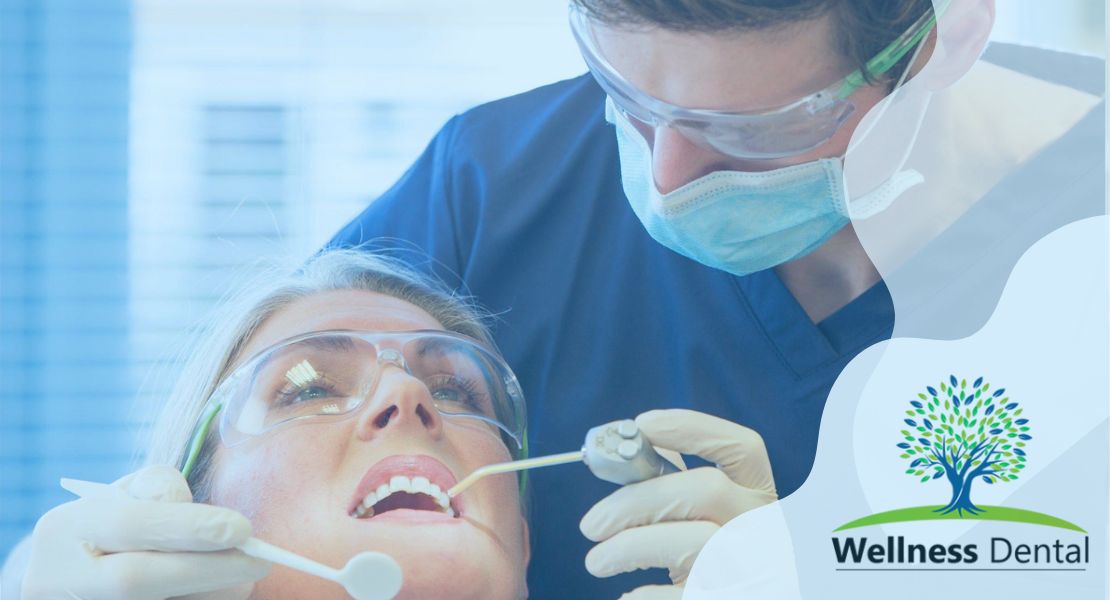After tooth extraction, it is important to take proper care of your mouth to avoid dry socket. Dry socket occurs when the blood clot forming in your empty socket is dislodged or damaged and can be very painful and interfere with the healing process. To prevent this from happening, here are some tips that you should follow:
- Avoid smoking or using any kind of tobacco product for at least 24 hours after the procedure. This will reduce your risk of developing dry socket as these products can delay healing and dislodge the clot.
- Follow your dentist’s instructions regarding eating and drinking after the extraction, as food particles can also get stuck in the wound area and lead to infection or dry socket.
- Rinse your mouth gently with warm salt water several times a day after surgery to keep the area clean and free from bacteria.
- Avoid strenuous activities such as heavy lifting or vigorous exercise for at least 24 hours after surgery, as this could increase your risk of dry socket too.
By following these tips, you can greatly reduce your chance of developing dry socket after a tooth extraction or dental implant procedure at Wellness Dental. If you experience any pain or discomfort during recovery, make sure to contact us right away so that we can provide appropriate treatment measures if needed!
It is Recommended to Avoid Using a Straw for 24–48 hours Following Surgery

The use of straws may create a suction that could disrupt the blood clot in the socket, leading to a dry socket. To prevent this, it is advised to refrain from using straws for 24–48 hours following the surgery. It is also suggested to avoid using straws for a few weeks after the procedure for optimal recovery. If you must drink something cold or carbonated, try using a spoon or sip through the side of your mouth.
Chew food carefully and avoid using straws for at least seven days post-procedure. Additionally, do not use straws when brushing your teeth as it may cause further damage. Avoiding straws can help ensure a smooth and complication-free tooth extraction or dental implant procedure.
Don’t Spit Hard After Rinsing for 1–2 Days After Extraction
Spitting vigorously after rinsing your mouth for any reason can create a lot of pressure that could dislodge the blood clot in your mouth. To prevent this, it’s important to avoid spitting or rinsing your mouth vigorously for at least 24–48 hours after the extraction. Instead, you should allow the liquid to drip out of your mouth naturally after rinsing.
Additionally, be sure not to brush your teeth too roughly during this time period and avoid using a toothpick to remove food particles from the socket area. Doing so can cause further damage and disturb the healing process.
Finally, if you experience any pain or discomfort due to dry sockets, it is best to consult with a dentist immediately for proper treatment. By following these simple tips and avoiding vigorous spitting and brushing, you can ensure that your tooth extraction or dental implant procedure goes smoothly and without complications!
Prevention

Preventing tooth extractions and dental implants from becoming complicated is important for ensuring a successful recovery. To prevent complications, there are several key steps that should be taken both before and after the procedure.
Before the procedure, it’s essential to follow your dentist’s instructions and make sure you’re up-to-date on any necessary vaccinations or other health precautions. Additionally, it’s important to maintain a healthy diet and practice good oral hygiene habits in order to keep your teeth and gums in top condition.
After the procedure, it’s important to follow all post-procedure instructions given by your dentist carefully. This includes avoiding smoking, drinking through a straw, brushing too roughly or rinsing your mouth too vigorously for 24–48 hours after the extraction.
In addition, contact your dentist right away if you experience any pain or discomfort due to dry sockets. By following these simple tips, you can help ensure that your tooth extraction or dental implant procedure goes smoothly and without complications!
Tooth Extraction Aftercare
Tooth extractions are a common procedure, and it is important to follow the dentist’s aftercare instructions properly to ensure proper healing. After the extraction, it is important to avoid drinking through a straw, smoking, brushing too harshly, or rinsing your mouth too vigorously for 24–48 hours.
It is also important to avoid any hard or crunchy foods on the side of the mouth where the extraction was done, as this could dislodge the blood clot. Additionally, if you experience any pain or discomfort due to dry sockets, contact your dentist right away.
Taking good care of your teeth and gums before and after an extraction procedure will help ensure that everything goes smoothly!
How to Clean the Mouth

After a tooth extraction, keeping your mouth clean is important. Don’t clean teeth near the extraction site on the day of the procedure. Brush and floss other teeth. The next day, start cleaning those areas gently. Use a soft-bristled toothbrush and warm salt water rinse if needed.
Mix half a teaspoon of salt into 8 ounces of warm water to make salt water. Rinse your mouth with warm salt water after meals to speed up healing and prevent infection. If you have high blood pressure, talk to your dentist about rinses or remedies. Following these steps will help you recover smoothly without complications.
Wait 48 Hours Before Smoking or Using Oral Tobacco

After tooth extraction, it is recommended to refrain from smoking or using any kind of oral tobacco for at least 48 hours. These actions can potentially cause dry socket and hinder the healing process at the extraction site. Furthermore, smoking has negative effects on both oral and overall health.
This presents a great opportunity to finally quit smoking if you have been considering it. Talk to your doctor about options for smoking cessation, and use this as motivation to make a change in your life. Remember that avoiding cigarettes and other forms of oral tobacco use can lead to a faster recovery!
Do Not Brush The Extraction Site Directly For 3–4 Days

Following a tooth extraction, it is recommended to avoid direct brushing of the extraction site for a period of 3–4 days. To avoid complications such as dry socket, it is recommended to not brush the extraction site. Instead, gentle mouth rinses with a prescription mouthwash or warm saline solution is preferred.
Regular brushing can still be done on other teeth, but it is advised to wait 4–5 days before brushing the extraction site. After that time, you may be able to start brushing nearby again, as long as it does not cause any discomfort. Following these instructions will help ensure a faster recovery and reduce any potential risks associated with tooth extractions.
Symptoms
Symptoms of dry socket can vary, but the most common signs include an intense throbbing or aching pain in the area where the tooth was extracted. The empty socket may also have an unpleasant odor and may seem to lack a blood clot. Other symptoms that can occur include fever, facial swelling, bad breath, and difficulty opening your mouth.
If you experience any of these symptoms following a tooth extraction, it is important to contact your dentist right away as they will be able to diagnose and treat the condition before it causes more serious issues.
Treatment typically involves cleaning out the socket and applying a medicated dressing to help promote healing. While it is not always possible to prevent dry socket, following your dentist’s instructions for aftercare can help reduce your risk.
Eat Soft Foods And Avoid Crunchy, Hard, And Tough Foods

It is important to follow your dentist’s instructions and eat soft foods after tooth extraction. This includes yogurt, smoothies, applesauce, pudding, and other soft foods. Avoid crunchy, hard, and tough foods for at least two weeks to give the socket time to heal properly.
Eating crunchy, hard, and tough foods can cause damage to the delicate tissues in the socket and may increase your risk of developing dry socket. Additionally, these types of food may be difficult or painful to chew if you have stitches in your mouth.
If you are unsure whether a particular type of food is appropriate for you to eat following an extraction, it is best to consult with your dentist before eating it.
Treatment
There are several treatments available to help a person recover from a tooth extraction. Irrigating the extraction site with sterile water can help remove food and debris and prevent infection. A medicated dressing may also be placed over the socket to protect it as it heals.
Additionally, packing the site with zinc oxide-eugenol paste can reduce pain and inflammation. Taking an NSAID such as ibuprofen can also help relieve pain and reduce swelling.
Lastly, eating soft foods for at least two weeks after an extraction is important to give the socket time to heal properly while avoiding crunchy, hard, and tough foods which could cause damage or make chewing more difficult or painful if there are stitches in your mouth.
FAQ
Q: Can you stop a dry socket from forming?
Although it is not always possible to prevent dry socket, following your dental professional’s post-operative instructions can reduce the chances of developing this condition. Making sure to rinse your mouth with salt water several times a day, brush gently and avoid hard, crunchy or tough foods can help ensure successful healing.
Taking an over-the-counter anti-inflammatory such as ibuprofen every four to six hours for the first few days after surgery can also reduce pain and swelling. Additionally, a medicated dressing may be placed over the extraction site to protect against infection and promote healing. Keeping up with these measures will assist in avoiding the development of dry socket.
Q: What is the main cause of dry socket?
The main cause of dry socket is usually a failure to follow post-operative instructions provided by the dentist or oral surgeon. A dry socket most commonly occurs when a blood clot fails to form in the tooth socket, due to smoking, drinking through a straw, using a mouthwash containing alcohol, or not taking prescribed antibiotics.
Additionally, eating crunchy, hard, and tough foods for at least two weeks after extraction can disrupt the healing process and increase the risk of developing dry socket. Therefore, it is important to adhere to your dentist’s instructions and eat soft foods following an extraction procedure.
Q: Does dry socket happen easily?
Dry socket is a painful condition that can easily develop, but there are steps you can take to reduce the risk. Make sure to rinse your mouth with salt water several times a day and gently brush your teeth. Avoid hard, crunchy or tough foods for at least two weeks after an extraction, as this could cause damage or make chewing more difficult or painful if there are stitches in your mouth.
Additionally, take an over-the-counter anti-inflammatory such as ibuprofen every four to six hours for the first few days after surgery to reduce pain and swelling.
Lastly, if recommended by your dentist, place a medicated dressing over the extraction site to protect against infection and promote healing. Adhering to these instructions will help ensure successful healing and reduce the risk of dry socket.
Q: Does salt water prevent dry socket?
Yes, salt water can help prevent dry socket. Rinsing your mouth with a saltwater solution several times a day after an extraction can be beneficial to the healing process. Saltwater helps to reduce swelling and irritation while also providing antibacterial benefits. To make the solution at home, mix one teaspoon of salt in eight ounces of warm water and swish it around your mouth gently before spitting it out.
Additionally, taking an over-the-counter anti-inflammatory such as ibuprofen every four to six hours for the first few days after surgery can help manage any pain or discomfort caused by dry socket.
Moreover, if recommended by your dentist, placing a medicated dressing over the extraction site will protect it against infection and promote healing. Adhering to these instructions will help ensure successful healing and reduce the risk of dry socket.
Q: How do I know if dry socket is forming?
It is important to be aware of the signs and symptoms of dry socket, so that you can take steps to prevent it or seek medical attention if needed. Common indications that dry socket is developing include pain radiating from the extraction site, a bad taste in your mouth, an unpleasant odor coming from the extraction site, visible nerve endings, and intense throbbing pain several days after surgery. If you experience any of these symptoms after an extraction, contact your dentist as soon as possible for further evaluation and treatment.
Q: What foods prevent dry socket?
After an extraction, it is important to adhere to your dentist’s instructions and avoid eating crunchy, hard, and tough foods for at least two weeks. This will help ensure successful healing and prevent dry socket from developing.
Additionally, opt for softer foods that are easy to chew and swallow such as soup, mashed potatoes, yogurt, smoothies, oatmeal, scrambled eggs, macaroni and cheese, applesauce or pudding. It is also important to stay hydrated by drinking plenty of water throughout the day.
Consuming a balanced diet full of protein-rich foods such as poultry or fish will also aid in the healing process. Lastly, take an over-the-counter anti-inflammatory such as ibuprofen every four to six hours for the first few days after surgery to reduce pain and swelling. Following these instructions will help you heal quickly and reduce the risk of dry socket.
Q: How long is the risk of dry socket?
The risk of dry socket is highest two to three days after the extraction, but can remain up to four days. As long as you adhere to your dentist’s recommendations and the tips mentioned above, the risk should diminish significantly.
Make sure to rinse your mouth with salt water several times a day, and take an over-the-counter anti-inflammatory such as ibuprofen every four to six hours for the first few days after surgery. Additionally, avoid hard, crunchy, or tough foods for at least two weeks and stay hydrated by drinking plenty of water throughout the day.
If recommended by your dentist, place a medicated dressing over the extraction site to protect against infection and promote healing. Taking these precautions will help ensure successful healing and reduce the risk of dry socket.
Q: What increases the risk of dry socket?
Smoking can increase the risk of developing dry socket, due to its ability to interfere with the natural healing process and reduce blood flow to the extraction site. In addition, using straws or other forms of suction while drinking can also increase the risk of dry socket.
This is because it disturbs the formation of a blood clot at the extraction site and therefore can lead to an increased chance of developing a dry socket. Furthermore, it is important to avoid vigorous activities such as strenuous exercise or heavy lifting following surgery in order to ensure that a blood clot forms properly.
Lastly, poor oral hygiene can also increase your chances of developing dry socket, as bacteria can accumulate at the extraction site and interfere with proper healing. By adhering to these instructions and avoiding the risk factors mentioned above, you can significantly reduce your chances of developing dry socket following tooth extraction.
Q: Does dry socket heal naturally?
A dry socket is a painful condition that can occur following tooth extraction. It develops when the blood clot fails to form properly at the extraction site, leaving exposed nerve endings and leading to intense, throbbing pain.
Unfortunately, dry socket does not heal on its own and requires professional treatment. The most common treatments involve placing a medicated dressing over the extraction site or using an antibiotic ointment if the infection is present.
Additionally, your dentist may recommend taking an over-the-counter anti-inflammatory such as ibuprofen every four to six hours for the first few days after surgery in order to reduce pain and swelling. It is important to follow your dentist’s instructions closely in order to ensure successful healing and prevent dry socket from developing.
Q: Can sneezing cause dry sockets?
Sneezing can potentially cause dry sockets if it is forceful enough to disturb the blood clot at the extraction site. While sneezing will not necessarily cause dry sockets, it is important to be mindful of your sneezes following tooth extraction and take precautions to ensure that you don’t accidentally disrupt the formation of a blood clot.
Additionally, it is important to avoid activities such as strenuous exercise or heavy lifting following surgery in order to reduce the risk of developing dry socket. It is also advisable to rinse your mouth with salt water several times a day and take an over-the-counter anti-inflammatory such as ibuprofen every four to six hours for the first few days after surgery in order to reduce pain and swelling. Following these precautions and your dentist’s instructions will help ensure successful healing and reduce the risk of dry socket.






